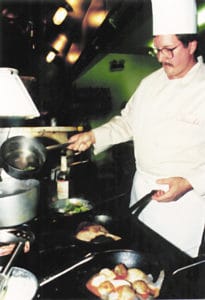By Merisa Sherman
I carried a glass from its spot in the “breakables” closet and carefully set it on the table. We were getting ready for the big Christmas Eve dinner at our house and it was my job to set the table. Shaking with excitement, my little 5-year-old self was finally deemed old enough to help mom prep for the big event. She would set one place setting at the head of the table, and it was my job to set the rest. It was a very important job, carrying these precious family heirlooms to the table.

Chef Claude Blais working “in the back of the house” of Choice’s Restaurant back in 2006.
It was pride I felt in providing a beautiful place for our family to gather round a table and celebrate together. Some of my best memories in life are from sitting around a table, whether it was in a restaurant or at a family home. As we ate, we would laugh and tell stories, new and old. And these shared memories bound us together as family.
My family was there the first night I ever worked in a restaurant, taking pictures of 14-year-old me struggling to carry trays way too big for my little body but grinning from ear to ear. I was there to make people happy, to ensure that they had a great time even if it wasn’t a great meal. I was proud, I was happy, and I was caught up with the idea of helping others to enjoy their evening.
But they don’t call it being in the trenches for nothing. And there are nights when it certainly feels like a battle as you sprint back and forth from the dining room to the kitchen, precariously balancing trays and plates and glasses, while having napkins tucked underneath your arm and reciting back to yourself the constantly changing list of things you need to get done. You are sweating, your feet are killing you, your knee is acting up and your hip just gave out. A few years ago, I walked 13 miles in one shift — and never wore a tracker to work again. Still, I love kicking my own ass to make sure my guests have an absolutely awesome experience. It’s simply great.
Even when those guests leave a lot to be desired. Because servers are oftentimes the punching bag for whatever mood the guests are in at the time. Hangry? Take it out on your server. Ordered the wrong item? It’s the server’s fault. Don’t like the state’s liquor laws? Definitely yell at your server. But even as some guests can ruin your night, most are wonderful, enjoying the trading of stories, savoring the flavors of the food and grateful for your efforts to create a memorable evening.
While most people believe the magic happens out in the dining room, it’s “the back of the house” where it truly happens. Hanging out in the kitchen, coworkers quickly become best friends and then family, especially since you eat more staff meals together than dinners with your own family. The ancient dishwasher tells the craziest stories while the old waitresses reminisce about days gone by. We speak in code and half sentences, too busy to slow down. Some nights we laugh and others we sit on the milk crate and cry.
Restaurant kitchens are where we bare our souls late at night while we polish the silverware. We find solutions to our daily problems as we set the tables for dinner service. Forced to work as a team to survive the night, we know each other’s movements and patterns. We build a strong bond and we become a united team. A team led by one person, who with grunts or shouts or frightening silence directs the night: the Chef.
He is more than the artist who runs the kitchen. He is the best of friends, the father figure, the person who you call in the middle of the night when you need a shoulder to cry on. Not only is he the one that feeds you, he’s the one who believes in you, who encourages you, who motivates you — even while he’s cursing at you to move faster and get these damn plates out of here! He might leave a dinner roll on the end of his station and point at you, an acknowledgement of thanks for your efforts. In so many ways, our chefs are our everything. They know our every move, our struggles on the floor, without even being told. And we nurture them in return, because for them we have nothing but love.
This week we said farewell to one of Killington’s beloved, Chef Claude, and a few years ago I lost my own Chef Frizzie. There is still a hole in my heart that I know will never be replaced. But we will continue to honor them in small ways that will go unnoticed by others but will mean the world to us. Somewhere along the way, we will have a slice of ganache cake, some jambalaya or even a simple knotted roll with butter and know that they will be with us forever.




